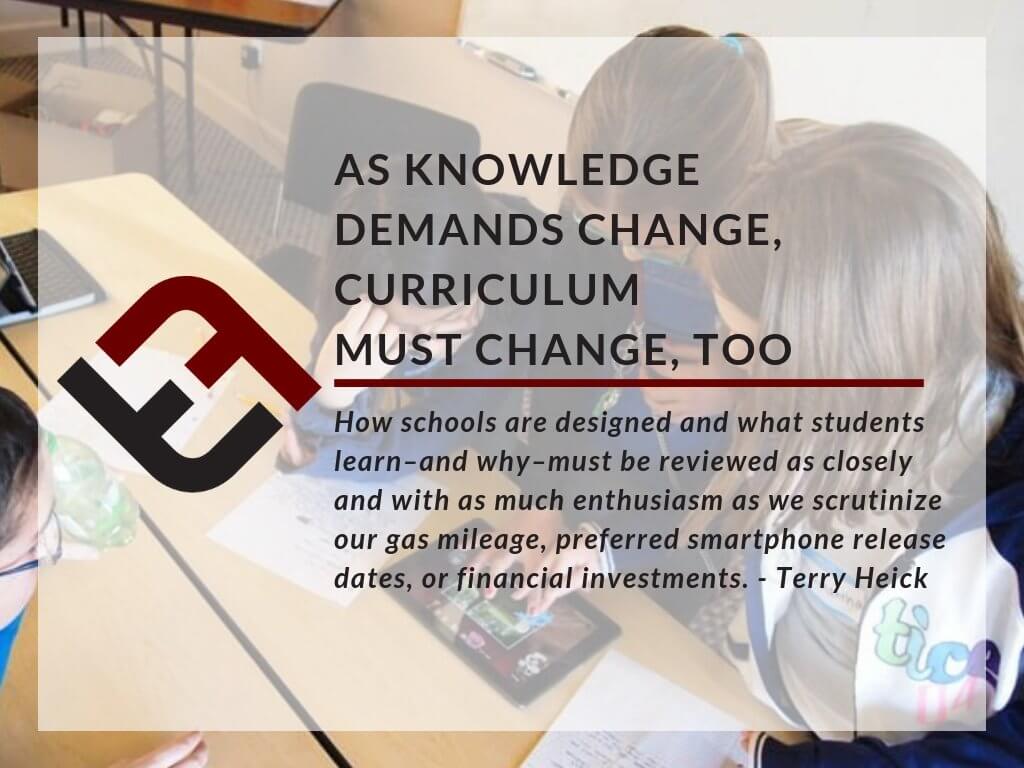
Changing Knowledge Demands In Education Means Curriculum Must Change, Too
by Terry Heick
Increasingly, the concept of changing knowledge demands in education is surfacing.
For example, take the idea of computer coding that is continuing to make headlines up in discussions about the classroom.This usually happens in the context of ‘21st-century learning,’ because, well, coding sounds like an exceptionally modern thing to do.
In Hollywood, computer coders are characterized as aloof and spectacled geniuses in green army jackets, who solve (narrative) problems in a kind of deus ex machina fashion. Hack the mainframe, change the school grades, save prom, etc.
In the news, coders are either painted as geniuses with keyboards, or an eclectic mix of cutting-edge vigilante and binary terrorist, with secret documents, scary viral threats, and national security all a part of their tools and struggle. Combined with the role digital technology increasingly plays in our lives, coding sits at an awkward intersection—misunderstood by most, but tangent to almost everything. So we should absolutely teach coding in schools, right?
Well, maybe.
Teaching Skills vs Teaching Content
It’s really more complicated than that.
Too often, new ideas are tacked onto curriculum as yet another perfectly-reasonable-sounding-thing to teach. Character training, drama, speech, debate, art, whole child, and dozens of other skills and topics have been injected into classrooms, but not always enduring.
In and of themselves these are worthwhile skills to have and things to know. One issue is that schools have limits (which may be more modest than we’d like to admit). Even the most incredible school with the most incredible teachers has a limited amount of instructional time during the year.
The students, too, have a finite capacity for meaningfully investing themselves in what they learn. This is an issue where curriculum—what students study—can look great on paper, but less ideal day in and day out in the classroom.
Changing Priorities
I was taught basic computer coding in the 1980s in elementary school. It was forced out by a push for foreign language as I recall—which has since, in some districts anyway, been pushed out for other new ideas–coding again, perhaps.
There is nothing wrong with changing priorities. In fact, this is a signal of reflection and vitality. Changing knowledge demands in education should dictate this effect, But when education itself—as it tends to do—continues to take a content and skills-focused view of what to teach rather than how students learn, it’s always going to be a maddening game of what gets added in, and what gets taken out, with the loudest voices usually winning.
To try to address this problem, let’s consider a more macro question: What is school? From the big picture down, it looks relatively simple.
Education is, more or less, a system of teaching and learning.
Teaching and learning are, more or less, concerned with knowledge.
And that knowledge can be broken down into two separate but connected parts: skills and content.
Skills are things students can ‘do’—procedural knowledge that yields the ability to do something. This could be revising an essay, solving a math problem, or decoding words to read.
Content can be thought of as a second kind of knowledge—a declarative knowledge. Something a student ‘knows.’ In math, this might be the formula to calculate the area of a circle. In composition, it could be a writing strategy to form sound and compelling paragraphs. In history, it may refer to the geographic advantages of one country in a conflict versus another.
Should schools focus on content and skills, or are there other possibilities we might consider? And does that answer change as the world changes and knowledge demands in education change?
Whether or not schools should teach coding is a question that cannot responsibly be answered by itself. Against the backdrop of rapid technological change, mass cultural adoption of technology, and the mediocre performance of our current education system, the question becomes just one of many that deserve our attention.
Without this kind of critique, coding will suffer alongside chemistry, music, and other miracles of knowledge that have had the life tortured out of them by a well-intentioned but brutal infrastructure.
It will be halved, then halved again, diced, packaged, and served at room temperature day after day after day until no one remembers what they’re doing or why they’re there.
Digital Literacy
Take for example the idea of literacy–the ability to read and write. This has been at the heart of teaching and learning since the very beginning of, well, everything. Not only is it a goal in and of itself, but it also is a prerequisite of other goals. Without the ability to read and write well, students struggle everywhere.
But instead of placing reading and writing at the core of school in general—kind of a backdrop for all learning–it is segmented into a class of its own. This gives English-Language Arts teachers in the United States struggle as many as five sets of Common Core Standards to teach.
Think of standards as a list of things a student needs to know. English-Language Arts teachers in the United States are responsible for teaching the following five sets of standards. Each set of standards has dozens of strands and grade-level standards within them.
- Reading: Informational
- Reading: Literature
- Reading: Foundational
- Writing
- Speaking & Listening
- Language
That’s a lot of information for teachers to meaningfully teach (rather than just ‘cover’). It’s also a lot for students to learn. This places tremendous pressure on educators to make numerous—and critical—adjustments their teaching on the fly, and decide quickly what content is most important.
It is in this context that we should have a conversation about coding, and any other new ideas we have for schools. It’s a system. Everything is connected. Changing knowledge demands in education means changing education.
But the world is changing; there is so much more that students need to know, right? This all is reminiscent of the Coen Brothers’ Raising Arizona. After hearing a long laundry list of things every baby needs from her friend Dot, Ed (Holly Hunter) turns to Hi (Nicholas Cage) in panic.
Ed: Who’s our pediatrician anyway? We ain’t exactly fixed on one yet, have we Hi?
Hi: *stunned silence*
Ed: No, I guess we don’t have one yet.
Dot: Jesus! Well, you gotta have one this instant!
Hi: *stunned silence*
Ed: What if the baby gets sick, honey?
Dot: Even if he don’t, he’s gotta have his dip-tet.
Ed: He’s gotta have his dip-tet, honey.
Dot: You started his bank accounts yet?
Ed: Have we done that? We gotta do that. What’s that for, Dot?
Dot: His orthodonture and his university!
Coding! Foreign Language! Technology! Science! Ethics! Egads!!!
The Changing Nature of Skills
Change causes uncertainty, and uncertainty can understandably cause insecurity and even panic.
Digital literacy can be thought of as “the ability to interpret and design nuanced communication across digital forms.”
Students need to be able to do this, yes? Of course. And speak a foreign language too, right? ‘Coding’ just means ‘speak computer.’ Like any new language, it’s just another collection of symbols with different factors and components and effects.
But these aren’t the questions we need to be asking. A more apt question might be, what should schools teach?
And why can’t education, as a system, refashion itself as fluidly as the digital technology that is causing it so much angst?
How should schools—and curriculum—be reconsidered in light of prevailing local technology and values?
And can we design them in a way that makes them revisable in parallel with the pace and scale of those changes?
Everything is Everything
Schools don’t exist in vacuums. They are pieces of larger ecologies that are first human and cultural. It isn’t just technology that changes. Technology changes because our collective desire for things changes – and, completing the circle, updates to technology change what we desire.
Mobile learning, digital citizenship, design thinking, collaboration, creativity, and on a larger scale, digital literacy (education is not yet comfortable enough with these ideas to teach ‘just digital citizenship‘ or ‘just literacy’) are all imminently useful. So is coding.
There are skills and content bits that every student would benefit from exposure to and mastery of. This is astoundingly important work that must be done while keeping the design of schools, the skillsets of teachers, and the value system of society in mind. If we don’t see the issue in its full context, we’re not seeing the issue at all.
How schools are designed and what students learn as knowledge demands in education change–and why–must be reviewed as closely and with as much enthusiasm as we scrutinize our gas mileage, preferred smartphone release dates, or financial investments.
In fact, in this era of information access, smart clouds, and worsening socioeconomic disparity, we may want to consider whether we should be teaching content at all – instead of truly teaching students to think.
As Knowledge Demands Change, Curriculum Must Change, Too

